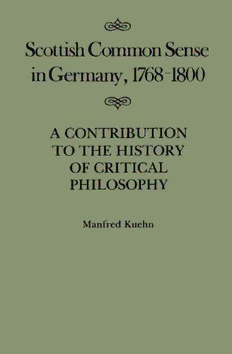
Scottish Common Sense in Germany, 1768-1800: A Contribution to the History of Critical Philosophy (Mcgill-Queen's Studies in the History of Ideas) PDF
315 Pages·1987·15.882 MB·English
Most books are stored in the elastic cloud where traffic is expensive. For this reason, we have a limit on daily download.
Preview Scottish Common Sense in Germany, 1768-1800: A Contribution to the History of Critical Philosophy (Mcgill-Queen's Studies in the History of Ideas)
Description:
He finds that the work of these philosophers was widely discussed in German philosophical journals and translated into German soon after its publication in Britain. Important German philosophers, such as Mendelssohn, Lossius, Feder, Hamann, and Jacobi, representing the full range of philosophical positions, read the Scots and found valuable philosophical insights in their thought. Kuehn suggests that the most important aspect of their reading was the perception of Scottish common-sense philosophers as opposing Hume's scepticism while complementing his positive teaching. Their views gave considerable impetus to those developments in German thought that ultimately led to Kant's critical philosophy. In fact Kant, whose devastating criticism of the Scottish common-sense philosophers is often cited, learned much from the Scots, as his Critique of Pure Reason reveals. Kuehn's analysis of the Scottish influence provides a new perspective on the German enlightenment and Kant's role within it, revealing the importance of problems of idealism versus realism and of philosophical justification versus mere descriptive metaphysics.
See more
The list of books you might like
Most books are stored in the elastic cloud where traffic is expensive. For this reason, we have a limit on daily download.
